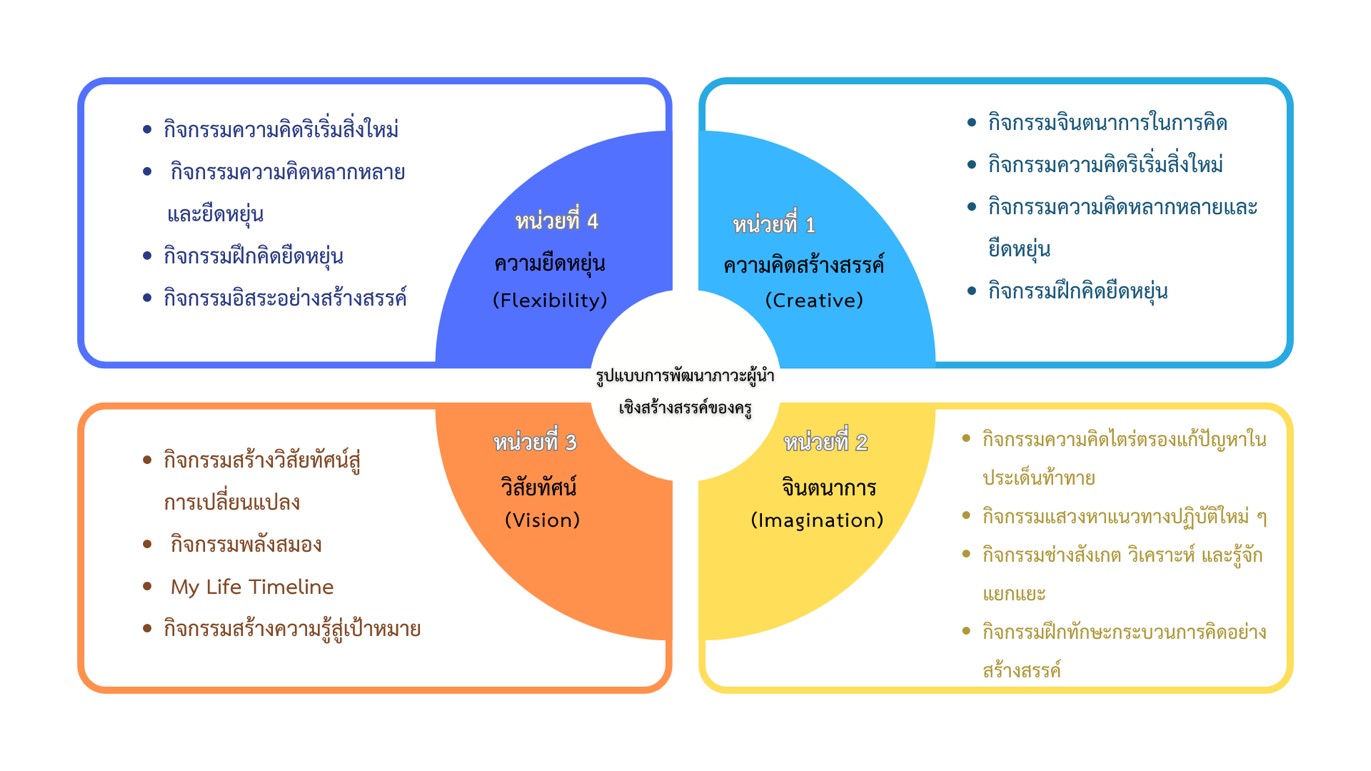A Model for Developing Creative Leadership in the Office of the Private Education Commission
Main Article Content
Abstract
The purposes of this research were 1) study an element and indicators of creative leadership of teachers, 2) investigate a current condition, desired s condition, and needs, 3) create a developing model and 4) evaluate a use of developed model. Is a mixed method research consisted of 4 phases: 1) study the documents and use the assessment form with 7 informants 2) use the assessment form with a sample of 377 people, collecting data by sending questionnaires online 3) interview 5 people with Best Practices and evaluated by 9 experts using the Connoisseurship technique and 4) Eight teachers used a knowledge test as an instrument. The instruments have a consistency index of each 1.00, Data were analyzed using content analysis, descriptive statistics, mean, standard deviation, and calculate the index of essential needs.
The results revealed that:
1. The creative leadership of teachers is 4 components, 14 indicators: 1) Imagination (4 indicators), 2) Flexibility (4 indicators), 3) Vision (3 indicators), and 4) Creativity (3 indicators).
2. The perspective of the current condition was at a high level; the desired condition was at the highest level; the first necessary need was Creativity.
3. The development model created consists of 4 elements and follows a four-stage development process: (1) Preparation (2) Training (3) Implementation and Knowledge Exchange and (4) Evaluation.
4. The teachers had the highest level of development after participating in the development model activity and teachers were at the highest level of satisfaction with the development model.
Article Details

This work is licensed under a Creative Commons Attribution-NonCommercial-NoDerivatives 4.0 International License.
เพื่อให้เป็นไปตามกฎหมายลิขสิทธิ์ ผู้นิพนธ์ทุกท่านต้องลงลายมือชื่อในแบบฟอร์มใบมอบลิขสิทธิ์บทความ ให้แก่วารสารฯ พร้อมกับบทความต้นฉบับที่ได้แก้ไขครั้งสุดท้าย นอกจากนี้ ผู้นิพนธ์ทุกท่านต้องยืนยันว่าบทความ ต้นฉบับที่ส่งมาตีพิมพ์นั้น ได้ส่งมาตีพิมพ์เฉพาะในวารสาร วิชาการธรรม ทรรศน์ เพียงแห่งเดียวเท่านั้น หากมีการใช้ ภาพหรือตารางของผู้นิพนธ์อื่นที่ปรากฏในสิ่งตีพิมพ์อื่นมาแล้ว ผู้นิพนธ์ต้องขออนุญาตเจ้าของลิขสิทธิ์ก่อน พร้อมทั้ง แสดงหนังสือที่ได้รับการยินยอมต่อบรรณาธิการ ก่อนที่บทความจะได้รับการตีพิมพ์References
คุณาวุฒิ สิงห์ทอง และธรินธร นามวรรณ. (2561). การพัฒนาโปรแกรมเสริมสร้างภาวะผู้นำเชิงสร้างสรรค์ของครูสำหรับสถานศึกษา สังกัดสำนักงานเขตพื้นที่การศึกษามัธยมศึกษา เขต 20. วารสารมหาวิทยาลัยราชภัฏร้อยเอ็ด, 12(1), 161-168.
ฉัตรชัย ดวงแก้ว. (2561). การพัฒนาโปรแกรมเสริมสร้างสมรรถนะการจัดการพัฒนาตนเองของสถานศึกษา สังกัดสำนักงานเขตพื้นที่การศึกษาประถมศึกษากาฬสินธุ์ เขต 2. วารสารบัณฑิตศึกษา, 62(1), 99-108.
ตรีนุช เทียนทอง. (2564). นโยบายการจัดการศึกษากระทรวงศึกษาธิการ ปีงบประมาณ 2564-2565. เข้าถึงได้จาก https://moe360.blog/2021/06/30/education-management-policy/
ทิศนา แขมมณี. (2551). รูปแบบการสอนทางเลือกที่หลากหลาย. (พิมพ์ครั้งที่ 5). กรุงเทพฯ: แอคทีฟ พริ้นท์.
ธีระ รุญเจริญ. (2554). กลยุทธ์การพัฒนาความเป็นบุคคลแห่งการเรียนรู้. กรุงเทพฯ: คุรุสภาลาดพร้าว.
บุญชม ศรีสะอาด. (2560). การวิจัยเบื้องต้น. (พิมพ์ครั้งที่ 10). กรุงเทพฯ: สุวีริยาสาส์น.
พุทธชาติ ภูจอมจิตร. (2565). การพัฒนาโปรแกรมเสริมสร้างภาวะผู้นำเชิงสร้างสรรค์ของผู้บริหารสถานศึกษา สังกัดสำนักงานเขตพื้นที่การศึกษาประถมศึกษานครราชสีมา เขต 6. วารสารมหาวิทยาลัยมหามกุฏราชวิทยาลัย วิทยาเขตร้อยเอ็ด, 11(1), 336-347.
พงษ์ศักดิ์ บุญเกื้อ. (2565). การพัฒนาโปรแกรมการพัฒนาภาวะผู้นำเชิงสร้างสรรค์ของผู้บริหารสถานศึกษา สังกัดสำนักงานเขตพื้นที่การศึกษาประถมศึกษา. (วิทยานิพนธ์ปรัชญาดุษฎีบัณฑิต). ขอนแก่น: มหาวิทยาลัยภาคตะวันออกเฉียงเหนือ.
ไพฑูรย์ สินลารัตน์. (2561). ความเป็นผู้นำทางการศึกษา. กรุงเทพฯ: จุฬาลงกรณ์มหาวิทยาลัย.
รัษฎากร อัครจันทร์. (2560). รูปแบบการพัฒนาภาวะผู้นำเชิงสร้างสรรค์ของครูในโรงเรียนประถมศึกษา สังกัดสำนักงานคณะกรรมการการศึกษาขั้นพื้นฐานในภาคตะวันออกเฉียงเหนือตอนบน. (วิทยานิพนธ์การศึกษาดุษฎีบัณฑิต). สกลนคร: มหาวิทยาลัยราชภัฏสกลนคร.
สถาบันวิจัยเพื่อความเสมอภาคทางการศึกษา. (2565). Learning Loss ภาวะการณ์เรียนรู้ถดถอย. เข้าถึงได้จาก https://research.eef.or.th/learning-loss-recession
สํานักงานคณะกรรมการส่งเสริมการศึกษาเอกชน. (2566). แผนพัฒนาการศึกษาเอกชน พ.ศ. 2566-2570. กรุงเทพฯ: นิติบุคคลเจี้ยฮั้ว.
สุวิมล ว่องวาณิช. (2558). การวิจัยการประเมินความต้องการจำเป็น. (พิมพ์ครั้งที่ 3). กรุงเทพฯ: จุฬาลงกรณ์มหาวิทยาลัย.
Ash, R. C., and Persall, M. (2007). The principle as Chief Leaning Officer: The New Work of Formative Leadership. Birmingham: Stamford University Birmingham.
Keeves, P. J. (1988). Model and Model Building Education Research, Methodology and Measurement: An International Handbook. Oxford: Pegamon Press.

